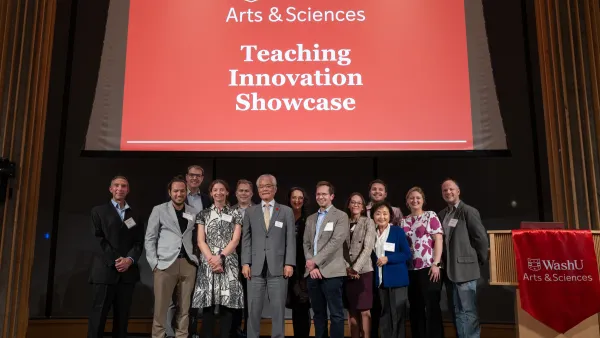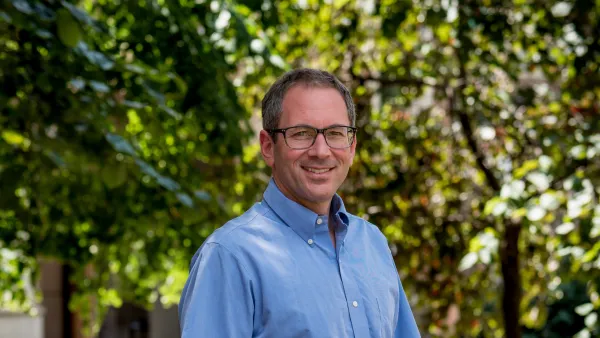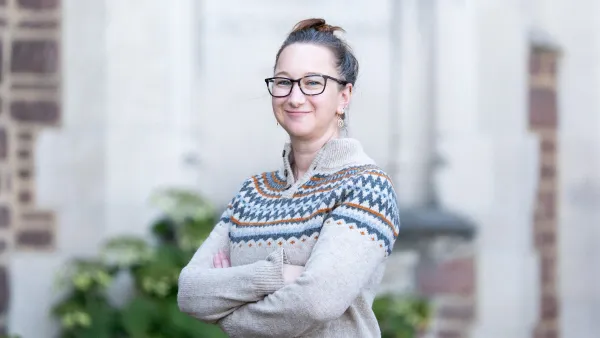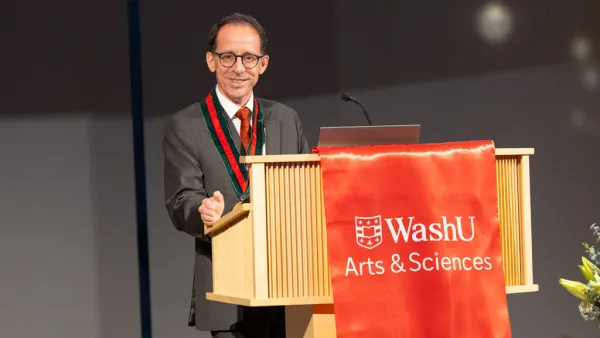Graduate student and McDonnell International Scholar Po-Cheng Lin delivers the winning presentation at the Three Minute Thesis competition held at the McDonnell Academy 7th International Symposium in Beijing, China.
“Have you ever thought about the gasoline or diesel that you use to power your car engines? Where do they originally come from? I believe all of you would answer fossil fuels, but can you imagine that these fuels can actually be made from bacteria?”
These are the questions that Po-Cheng Lin, fourth-year graduate student in the Department of Energy, Environmental and Chemical Engineering (EECE) and McDonnell International Scholar, asked to capture the audience’s attention and win the Three Minute Thesis (3MT) competition held at the McDonnell Academy 7th International Symposium in Beijing, China.
“You need to draw people’s attention in the first three sentences because you only have three minutes,” said Lin. “I wanted to say something different. I wanted to talk about something that relates to people’s daily lives, something special to them.”

Lin did just that. As one of five finalists competing in the 3MT at the Symposium co-hosted by Tsinghua University and Washington University, he won both the 3MT Judges’ and People’s Choice Prizes.
“I am thrilled that Po-Cheng won these accolades. Along with Chancellor Wrighton and John McDonnell, we celebrated his receiving the awards on October 13, 2018 in Beijing,” said Dr. Himadri Pakrasi, professor in the Department of Biology and director of the International Center for Energy, Environment and Sustainability (InCEES).
Lin is doing his thesis work in the Pakrasi Lab in the Department of Biology. He is being co-advised by Dr. Fuzhong Zhang, associate professor in the Department of Energy, Environmental and Chemical Engineering. His research work is supported by funding from the Department of Energy (Biological and Environmental Research; BER) in the Pakrasi lab.
Lin’s thesis project – as he clearly articulated in his three-minute presentation – focuses on engineering cyanobacteria, photosynthetic organisms, into fuel-producing factories in the hopes of one day reducing our dependence on fossil fuels.
The 3MT, developed by the University of Queensland in 2008, celebrates research performed by PhD students worldwide. It challenges students to explain their research in three minutes using language appropriate to a non-specialist audience.
The competition that Lin participated in was a modified version of the original 3MT competition. Organized by the McDonnell International Scholars Academy, graduate students in thirty-five partnering institutes worldwide were invited to present their research while addressing one of three themes: agriculture, food and water; public health and aging; and energy and environment.
First, Lin submitted a three-minute YouTube video and was one of two Washington University students chosen to compete in 3MT. Next, he was one of forty students chosen to continue to the semi-finals and one of five students asked to compete live at the Symposium. Lin’s 3MT addressed the energy and environment theme.
“I was lucky because it is difficult for the judges to judge these competitions. I watched the other two themes; those finalists did very well. It was very hard to just pick one winner,” said Lin.
But luck was not the only force at play. Lin spent hours preparing for his presentation, a process he was very thoughtful about. He practiced his script in front of family and friends. He also watched videos on how to give a speech and studied speeches of great speakers.
Most importantly, Lin implemented what he learned. “I learned that if you are trying to emphasize something, you should step forward. For example, when I talked about my recent result of getting a 7-fold improvement, I moved forward to emphasize the impact of that result,” said Lin.
Some would argue that Lin’s preparation for the 3MT started years earlier, since the day he became a McDonnell International Scholar. McDonnell International Scholars Academy at Washington University was founded in 2005 with the goal of training future leaders to tackle global challenges. As a scholar, Lin has participated in numerous leadership and presentation training activities, including a PhD in 3D competition similar to the 3MT.
“I am fortunate to be in this Academy. All the training I have had, both in the lab and in the Academy, has come together. Without it, I would not have been able to do this,” said Lin.
The Academy is composed of scholars from all around the world who have different backgrounds and cultures. They are encouraged to interact and get to know different people to learn more about the world.
“I interact with biologists, engineers, anthropologists, lawyers, and economists. These interactions make science communication so important because I talk with many different people with such different background,” said Lin.
“We as scientists need to explain to the public that scientific research is important. One of the problems between researchers and the public is that researchers think they are doing important things but the general public doesn’t know about it,” said Lin.
Lin admits that the hardest part of the competition was writing the script.
“I had to forget about all the scientific words I use daily in the lab. In my presentation, I didn’t mention cloning, engineering or promoters. It was a good learning process,” said Lin.
“I had to forget about all the scientific words I use daily in the lab. In my presentation, I didn’t mention cloning, engineering or promoters. It was a good learning process.”
As Lin reflects on the time in the lab and in the Academy and embarks on his final year of graduate school, he hopes to continue his scientific career in an industry setting.
“In the lab, I may see a seven-fold improvement in fuel production. But that is in a small flask. There are all types of issues you have to deal with when scaling up. I am interested in translating that knowledge into solving real-world problems,” said Lin.
In the meantime, he continues communicating about the green little bugs, the cyanobacteria, that hold the promise to a more sustainable future.



